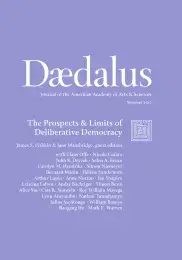Deliberative Democracy as Open, Not (Just) Representative Democracy
Deliberative democracy is at risk of becoming collateral damage of the current crisis of representative democracy. If deliberative democracy is necessarily representative and if representation betrays the true meaning of democracy as rule of, by, and for the people, then how can deliberative democracy retain any validity as a theory of political legitimacy? Any tight connection between deliberative democracy and representative democracy thus risks making deliberative democracy obsolete: a dated paradigm fit for a precrisis order, but maladjusted to the world of Occupy, the Pirate Party, the Zapatistas, and other antirepresentative movements. This essay argues that the problem comes from a particular and historically situated understanding of representative democracy as rule by elected elites. I argue that in order to retain its normative appeal and political relevance, deliberative democracy should dissociate itself from representative democracy thus understood and reinvent itself as the core of a more truly democratic paradigm, which I call “open democracy.” In open democracy, popular rule means the mediated but real exercise of power by ordinary citizens. This new paradigm privileges nonelectoral forms of representation and in it, power is meant to remain constantly inclusive of and accessible–in other words open–to ordinary citizens.
